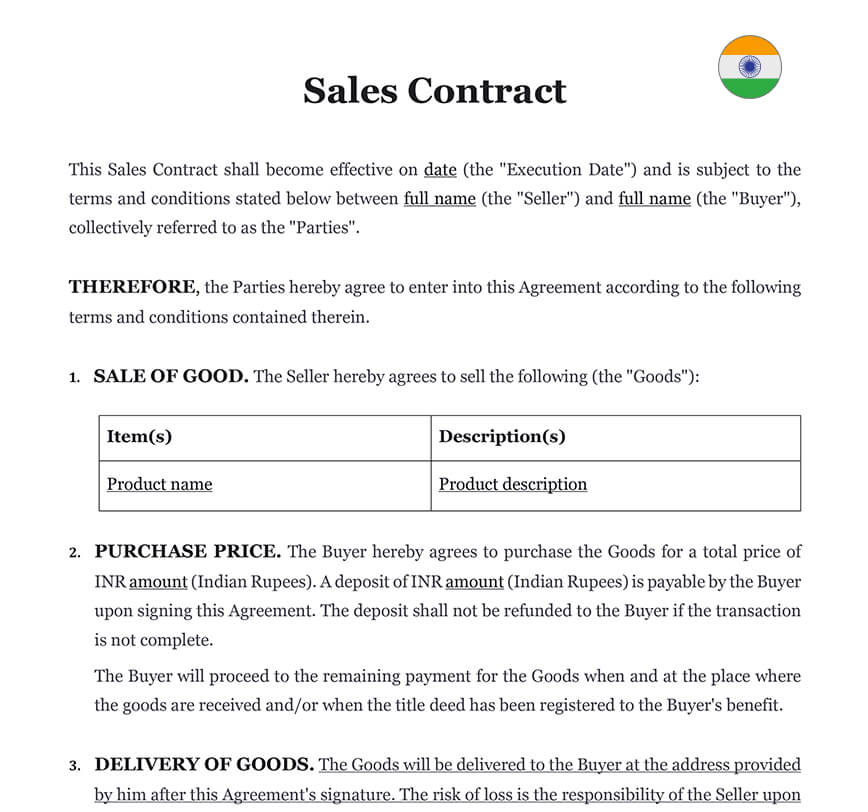Ready to use legal template
Drafted by experienced lawyers
Compliant with Indian law
Ready to use legal template
Drafted by lawyers
Compliant with Indian law
Home › Business contracts › Sales contract
Learn more about Sales Contract in India
A Sales Contract in India is a legal document that defines the terms of sale between a buyer and a seller, covering product specifications, price, delivery terms, warranties, and payment obligations. It ensures both parties have a clear understanding of their rights and responsibilities and helps prevent legal disputes. Governed by the Indian Contract Act, 1872, a valid Sales Contract is a must-have in business transactions to ensure enforceability and commercial protection. Whether you’re involved in the sale of goods or services, a written contract adds legal security and professionalism. Download our Sales Contract template, professionally drafted and easy to personalize in Word format, tailored to support secure and efficient business deals in India.
Table of contents
What is a Sales Contract?
A sales contract is an agreement whereby one party undertakes to deliver a thing and the other to pay for it. In other words, the buyer is obliged to pay the price of the good and conversely, the seller is obliged to deliver the good. It is a transfer of property paying. The delivery of the goods at the expense of the professional salesman does not imply an obligation of delivery. In principle, it is up to the buyer to recover the goods from the seller, but the sales contract can provide for an obligation of delivery on the part of the seller.
Moreover, in all sales contracts, the seller is subject to the obligation to provide information. The buyer must be able to know all the terms of the contract before the sale is made. The seller is also obliged to guarantee the buyer against hidden defects and to deliver a good that conforms to what has been agreed upon. Finally, he is responsible for the safety of the object sold, and is liable in case of damage. He cannot be released from his responsibility because of the defectiveness of the product with a limitation of responsibility clause.
Why draft a written Sales Agreement?
Generally speaking, the agreement to sell can be tacit, or oral: the contract of sale does not have to be in writing, there is no legal obligation. However, certain categories of property must be the subject of a written contract of sale, sealed by an authentic act, i.e. received and drawn up by a notary. This is the case, for example, for real estate sales.
In the event of a dispute, the contract has the value of proof: for transactions of a certain importance, and in particular between professionals, it is advisable to establish one’s agreement by means of a contract of sale in order to better secure the transaction.
Although in commercial matters, the method of proof is free. It is much easier to prove the sale with a written sales contract mentioning the price to be paid, the good(s) sold and the agreement of the legal representative (by means of his signature).
Moreover, if the parties want to add specific clauses not provided for by the law (reservation of ownership, delivery at the seller’s expense, payment of the price in instalments, etc.), the written sales contract makes it possible to prove that the signatories have accepted the general conditions of the sale.
How to draw up a Sales Contract?
The contract for the sale of goods can therefore be drawn up in writing to ensure better protection. When you decide to use a written contract, it must respect a particular formalism and indicate certain obligatory mentions, under penalty of nullity.
Your sales contract must therefore contain specific elements. Download Themis Partner’s sales contract template to obtain an official sales contract that can be modified according to your needs.
In this contract you will find and have to fill in mandatory elements, such as:
| ➤ The identification of the parties to the contract |
| ➤ The description of the object of the contract |
| ➤ The duration of the contract |
| ➤ The date |
| ➤ The signature of the parties |




